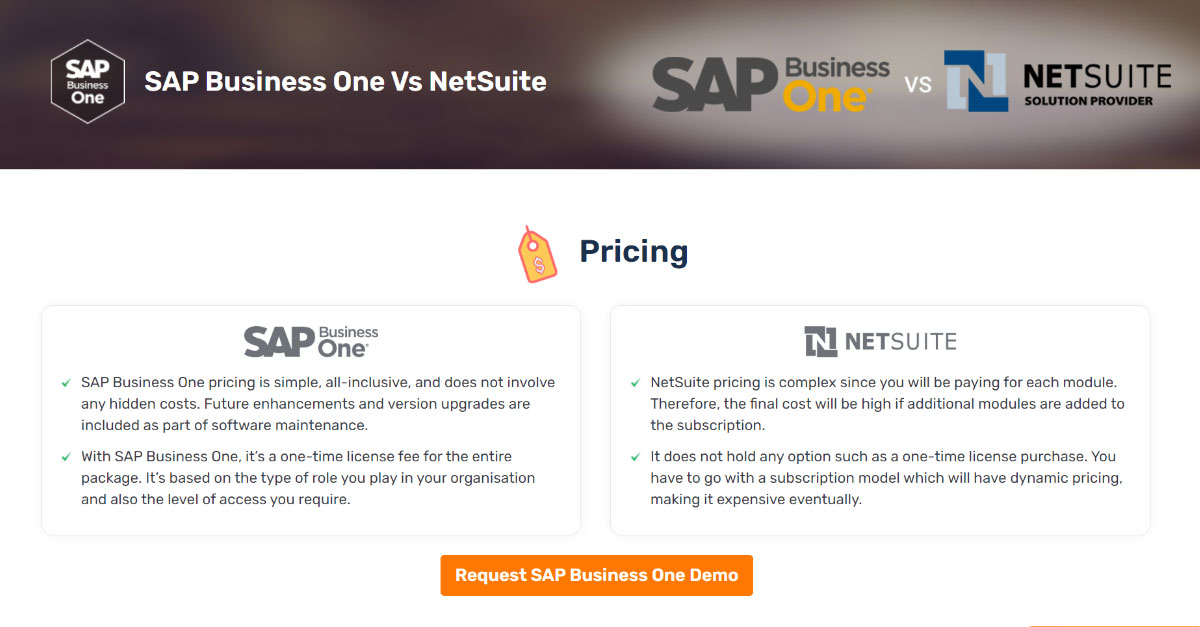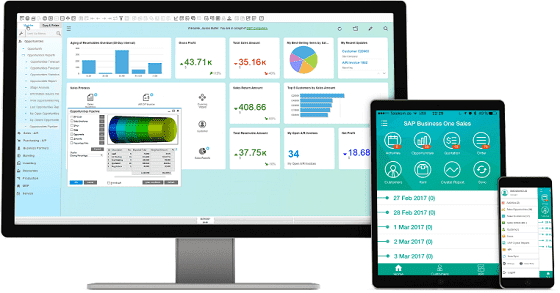 10 Things You Must Know SAP Business One vs NetSuite
10 Things You Must Know SAP Business One vs NetSuite

Making an Informed Choice: SAP Business One vs. NetSuite – 10 Key Considerations
In the ever-evolving world of business software, choosing the right solution for your company can be a pivotal decision. Two major players in this landscape are SAP Business One and NetSuite. To help you navigate this choice effectively, here are ten key considerations that shed light on the differences between the two systems.
- Pricing Complexity and Long-Term Costs
- NetSuite’s complex pricing structure often leads to unpredictable long-term subscription costs. Initial heavy discounts might be enticing, but these discounts often cease after the initial term. Additionally, extra modules added after signing up don’t receive the same discounts, raising questions about future scalability and costs. SAP Business One offers a more straightforward approach to pricing, avoiding the uncertainty associated with NetSuite’s pricing model.
- Upgrades and Flexibility
- NetSuite’s product upgrades have earned a reputation for being problematic, inflexible, time-consuming, and costly. Upgrade testing often excludes customizations and partner modules, leading to potential disruption during the upgrade process. SAP Business One offers a more flexible approach to upgrades, allowing you to have better control over the timing and speed of your system upgrades without incurring additional costs for flexibility or choice.
- Customer Support
- NetSuite’s offshore support team focuses primarily on features and functions, rather than offering guidance tailored to your specific business processes. This approach can lead to disconnects between support and your business needs. SAP Business One provides the option of local partners who not only understand your industry but also your unique support requirements.
- Implementation Approach
- NetSuite primarily relies on offshore consulting resources at local consulting rates for implementation. SAP Business One emphasizes local resources that can implement all application modules proposed, working closely with you on critical tasks throughout the implementation process.
- Unified Functionality
- NetSuite’s product portfolio often requires customers to purchase advanced modules or functionality from acquisitions or partners, leading to a mix-and-match approach, batch integration, different workflows, and a lack of unified data models or user experiences. SAP Business One offers a more integrated and unified approach, minimizing the need for constant renegotiation of solution costs.
- Cloud Deployment and User Experience
- NetSuite positions itself as a native Cloud solution with a modern user experience that’s free from the pains associated with on-premises systems. SAP Business One, however, offers a choice of deployment models that do not dictate your performance, security, flexibility, and ongoing data access.
- Demo vs. Production
- NetSuite demos often showcase flashy role-based analytics and workflows that appeal to line-of-business (LOB) buyers, but these may not be fully supported in production. SAP Business One aims to maintain consistency between demo showcases and actual production support.
- Global Localization and Presence
- NetSuite’s global presence is expanding, but its localizations are often shallow, primarily focusing on core sales tax compliance and languages. SAP Business One boasts a deep history of serving a global market with extensive localized functionality and a proven partner network in over 150 countries.
- Industry Emphasis
- NetSuite’s Suite Success approach emphasizes tailored industry functionality and quick implementation, aiming to get clients live in under 100 days. However, this approach might not always align with your unique value proposition to your customers. SAP Business One focuses on providing industry solutions that align more closely with your business needs.
- Market Confusion
- NetSuite and Oracle products often lack clear market delineation, causing confusion for potential customers about the right fit for their needs. SAP Business One offers a clearer market positioning and product direction.
In conclusion, the choice between SAP Business One and NetSuite depends on various factors, including your organization’s size, goals, complexity, and global presence. Understanding these ten considerations can guide you towards making a well-informed decision that aligns with your business objectives.


